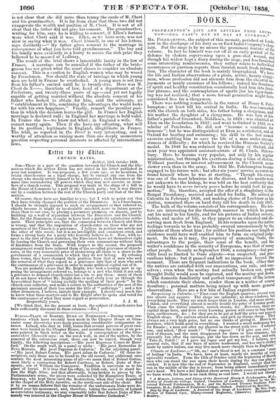1lff In fly ellitur.
CHURCH RITES.
Belfast, 13th October 1858. Sra—There is a part of the question between the Church and the Dis- senters which Sir Arthur Elton has not stated in his letter published in your last number. It was proposed, a few years ago, as he mentions, to retain church-rates as a legal charge but to exempt any one from the charge who should certify himself to be a Dissenter ; such Dissenters at the same time surrendering all powers which they may now exercise as mem- bers of a church vestry. This proposal was made in the shape of a bill in the House of Commons by a part of the Church party ; but it was thrown out by a coalition between the rest of the Church party and that of the Dis- senters.
Of course, these facts are familiar to you ; but I wish to point out that they have totally changed the position of the Dissenters. As a Churchman, I should be strongly opposed to such an arrangement as that referred to, chiefly because it might do incalculable mischief, more to future genera- tions than to our own, by placing a pecuniary premium on dissent, and by building up a wall of separation between tile Dissenters and the Church. But, for the Dissenters, it ought to have been a perfectly satisfactory settle- ment. Their principles are, that the connexion between Church and State is wrong, and that the imposition of church-rates on those who are not members of the Church is a grievance. I believe in neither one article nor the other of this creed ; but it is an intelligible and consistent creed, and forms a strong basis for a party who honestly believe in it. Now, with re- spect to the first of these doctrines, the Dissenters have set themselves right by leaving the Church and governing their own communions without help or hindrance from the State. With respect to the second, the proposed arrangement would have relieved them of the so-called grievance of church- rates, at the very reasonable price of abandoning all claim to a share in the government of a communion to which they do not belong. By refusing these terms, they have changed their position from that of men who seek the removal of what they regard as a grievance into that of men who seek the continuance of a grievance in order to make political capital out of it. You are probably aware that Mr. Bright, who took a leading part in op- posing the arrangement referred to, belongs to a sect who think it not only a grievance to demand church-rates but a sin to pay them : many of them (I do not know whether Mr. Bright does or not) every year go through the hypocritical farce of "taking joyfully the spoiling of their goods" by the church-rate collector, and make a return to the authorities of the sect of the pecuniary amount of their loss under the title of " sufferings " ; and a few other Dissenters, I believe, imitate their example. I should very much like to know what these martyrs said to Mr. Bright after he spoke and voted for the continuance of what they must regard as persecution. Respectfully yours, J. J. M. [We think that, for the present at least, the subject of church-rates has been sufficiently discussed in these columns.—En.]


























 Previous page
Previous page